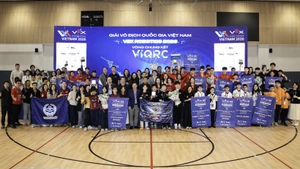At the 2024 conference on digital transformation in education and training, Nguyen Son Hai, Director of the Information Technology Department under the Ministry of Education and Training (MOET), stated that applying information technology and digital transformation in education and training has achieved many important results.
The entire sector has completed building its databases and successfully connected them with national databases. The MOET has issued many documents for higher education to improve the legal framework promoting information technology applications and digital transformation.
Since 2022, the ministry has implemented a higher education database system, compiling data from all universities nationwide, including data groups on faculty, students, training programmes, majors, facilities and financial assets.
Data has been digitised for approximately 470 higher education institutions, over 25,000 training programmes, over 100,000 staff records, and nearly three million student records. Additionally, higher education data is used for state management, reporting and statistics, ensuring overall synchronisation with the universities’ public database systems.
The application of information technology for high school graduation examinations and university admissions has been implemented comprehensively, from exam registration, admission preference registration, admission fee payment, and enrolment confirmation conducted online for all candidates.
Since 2022, the MOET has completed the deployment, provision and integration of level-four public services for high school graduation exam registration and integrated online payment platform provided on the National Public Service Portal.
In 2024, the public service system received applications from more than one million candidates registering for high school graduation exams, with online registrations reaching over 94.66%; nearly 4 million admission preferences were registered online.
In addition to schools actively implementing digital transformation, the implementation methods are becoming more systematic and organised, enhancing the effectiveness of data-driven and digital technology-based management.
According to Associate Professor Dang Hoai Bac, President of the Posts and Telecommunications Institute of Technology (PTIT), faculty and students no longer view concepts of digital transformation and digital university as novel or distant.
Through PTIT’s digital ecosystem, which includes Digital Management-Digital Services-Digital Society, students, staff and faculty members can perform activities, track class schedules, view exam scores, confirm administrative matters, and pay tuition fees via smartphone.
Digital transformation in university management is a user-centric management approach that operates educational institutions based on the application of digital technology, big data, artificial intelligence and smart analytical tools to optimise management efficiency, improve educational quality, research, and resources, as well as respond quickly and flexibly to changes in the academic environment, to achieve the set strategic goals.
Sharing about artificial intelligence in universities, Associate Professor Ta Hai Hung, Dean of the School of Information and Communication Technology under Hanoi University of Science and Technology (HUST), said: “Artificial intelligence has achieved many breakthroughs and become an important factor in improving education quality through modern solutions, such as personalised learning, teaching support, and expanding access to knowledge.”
He added that applying artificial intelligence in education helps track students’ learning progress and automatically adjusts content, learning pace and lesson difficulty. Simultaneously, it evaluates students’ learning effectiveness through learning data analysis and automatic grading, providing personalised feedback. Artificial intelligence helps teachers plan detailed teaching schedules and grades and provide detailed comments for each student.
Currently, HUST is leading the development of a pilot project for the digital higher education model, aiming to share resources based on developing a national platform and educational materials system while effectively utilising valuable existing learning resources worldwide.
Therefore, implementing artificial intelligence applications in school activities in particular and educational institutions in general is mandatory and needs to be implemented as soon as possible.
MOET Deputy Minister Hoang Minh Son assessed that no sector is impacted by digital transformation and artificial intelligence as strongly as education and no sector benefits more from information technology development and digital transformation than education.
Besides being impacted by and benefiting from information technology, the education sector also has a great mission in training human resources and ensuring digital human resources for the country. In the coming time, the education sector, especially higher education, has an important task of training high-quality human resources in the digital technology field, thereby attracting foreign corporations to invest in areas and stages related to research and development, promoting the development of the entire innovation ecosystem of the industry.
To continue promoting digital transformation in higher education and ensure human resources drive digital transformation across sectors, the MOET has completed the pilot project for a digital higher education model and the project for training high-quality human resources for high technology, which will be submitted to the Prime Minister for approval.
The ministry has also completed drafting and will soon issue a digital competency framework for learners from preschool to university level (including AI application competencies) to enhance learners’ digital capabilities, meeting national digital transformation requirements. These projects and the digital competency framework are expected to be implemented in 2025, immediately after receiving approval from competent authorities.
















